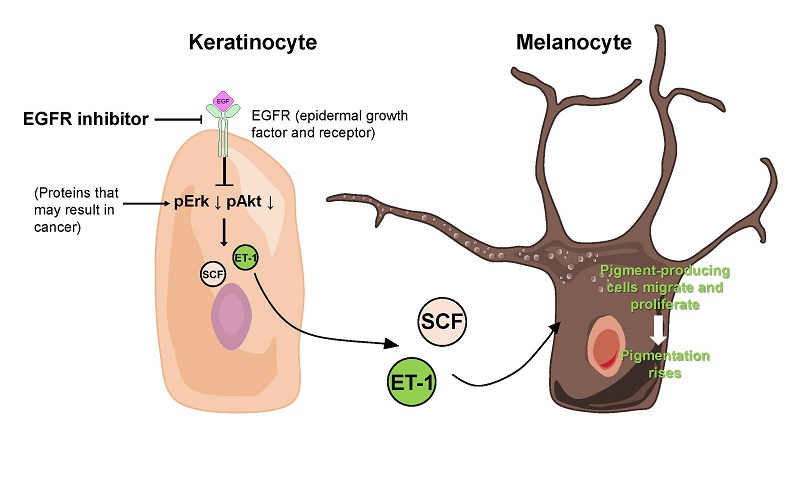Research News
Sep 12, 2024
- Medicine
Uncovering how anticancer drug affects skin pigmentation
How EGFR tyrosine kinase inhibitors affect pigment-producing cells
EGFR-TKI significantly increases stem cell factor (SCF) and endothelin-1 (ET-1) in keratinocytes, promoting migration and proliferation of melanocytes.
Credit: Osaka Metropolitan University

EGFR tyrosine kinase inhibitors (EGFR-TKIs) are used in cancer treatment, especially for lung cancer, but they can affect skin pigmentation. Graduate School of Medicine Specially Appointed Associate Professor Lingli Yang, the corresponding author, and researchers including Specially Appointed Professor Ichiro Katayama have elucidated the effect of EGFR-TKI on skin pigmentation and the mechanism behind it.
Epidermal growth factor and its receptor (EGFR) play important roles in cell growth, wound healing, and skin homeostasis. The research group confirmed the distribution of epidermal growth factors and receptors in 12 types of skin cells, including neonatal and adult keratinocytes, and found that they are predominantly expressed in these keratinocytes. They also found that EGFR-TKI significantly increased stem cell factor and endothelin-1 in keratinocytes, promoting migration and proliferation of melanocytes (pigment-producing cells), thus increasing pigmentation.
The findings were published in Pigment Cell and Melanoma Research.
Paper information
Journal: Pigment Cell & Melanoma Research
Title: Effects of EGFR-TKI on epidermal melanin unit integrity: Therapeutic implications for hypopigmented skin disorders
DOI: 10.1111/pcmr.13171
Authors: Ping Xu, Lingli Yang, Sylvia Lai, Fei Yang, Yasutaka Kuroda, Huimin Zhang, Daisuke Tsuruta, Ichiro Katayama
Published: 5 May 2024
URL: https://doi.org/10.1111/pcmr.13171
Contact
Lingli Yang
Graduate School of Medicine
Email: yang.lingli[at]omu.ac.jp
*Please change [at] to @.
SDGs
